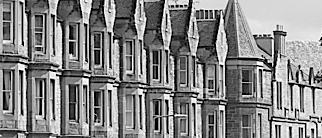The Scottish Property Federation (SPF) has called for the 5% tax threshold of Scotland’s residential Land and Buildings Transaction Tax (LBTT) to be raised from £325,000 to £500,000 following “evidence suggesting a downturn in the value and number of transactions at this level of the market in the first year of LBTT.”
The plea was made in the industry body’s submission to the Scottish Parliament’s Finance Committee inquiry into the first year operation of LBTT.
The SPF believes the main impact on the property markets have been at the high value end of the residential market — above £325,000 — where both the value and number of transactions fell after several years of growth.
The SPF said it understood that this contributed to a shortfall in anticipated LBTT revenue from the residential sector and had a negative impact on the functioning of the wider residential property markets in Scotland.
“The residential market is a continuum that requires buoyant activity across all tenures at all levels in order to succeed,” according to the SPF.
By contrast, it said that in the commercial property markets, where there was much less radical reform of rates and thresholds, the markets produced more revenue than expected.
David Melhuish, director of the Scottish Property Federation, commented: “While the tax seems to have bedded in well for much of the lower value markets we feel there are improvements to the rates and thresholds for the residential 5% band in particular, which is very narrow under the current regulations.
“In the residential market, we need to ensure buoyant activity across all tenures.
“People need to upsize and downside as well as relocate for work or other reasons.
“If you make it harder for people to move at the higher end of the market, then it makes it more difficult for people aspiring to move into that market.
“This then makes is more difficult for people to get a foot in the housing market at all if the number of properties available is reduced.”
Another trade body, Homes for Scotland, last month called for the 5% tax band to be extended up to a price of £925,000, the same as in England.
